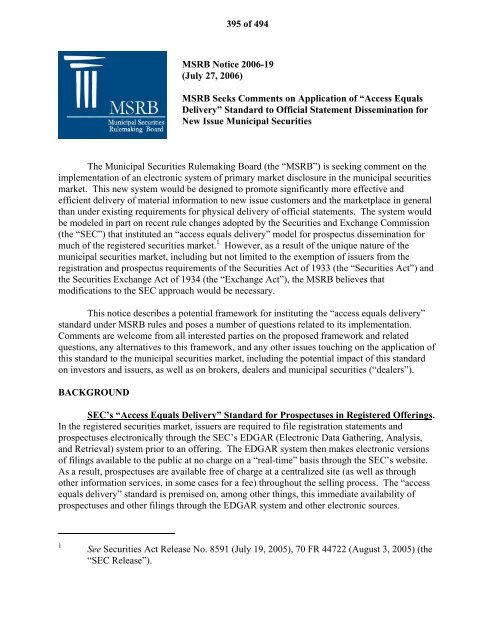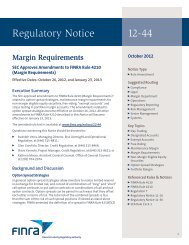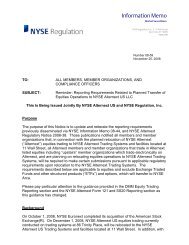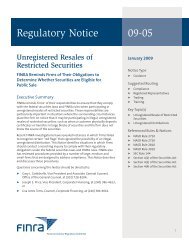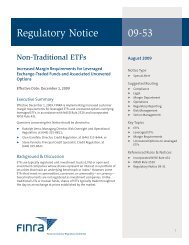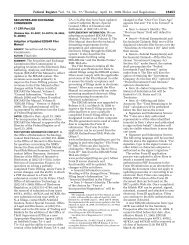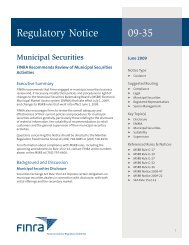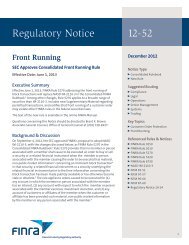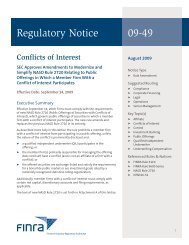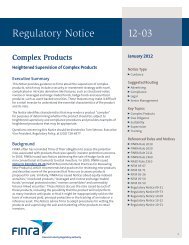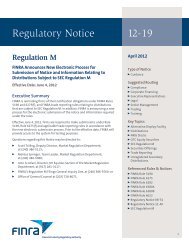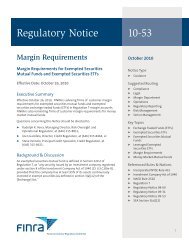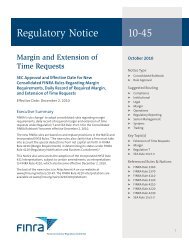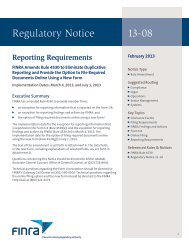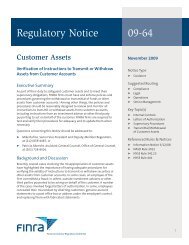Form 19b-4 - FINRA - Rules and Regulations
Form 19b-4 - FINRA - Rules and Regulations
Form 19b-4 - FINRA - Rules and Regulations
Create successful ePaper yourself
Turn your PDF publications into a flip-book with our unique Google optimized e-Paper software.
395 of 494<br />
MSRB Notice 2006-19<br />
(July 27, 2006)<br />
MSRB Seeks Comments on Application of “Access Equals<br />
Delivery” St<strong>and</strong>ard to Official Statement Dissemination for<br />
New Issue Municipal Securities<br />
The Municipal Securities Rulemaking Board (the “MSRB”) is seeking comment on the<br />
implementation of an electronic system of primary market disclosure in the municipal securities<br />
market. This new system would be designed to promote significantly more effective <strong>and</strong><br />
efficient delivery of material information to new issue customers <strong>and</strong> the marketplace in general<br />
than under existing requirements for physical delivery of official statements. The system would<br />
be modeled in part on recent rule changes adopted by the Securities <strong>and</strong> Exchange Commission<br />
(the “SEC”) that instituted an “access equals delivery” model for prospectus dissemination for<br />
much of the registered securities market. 1 However, as a result of the unique nature of the<br />
municipal securities market, including but not limited to the exemption of issuers from the<br />
registration <strong>and</strong> prospectus requirements of the Securities Act of 1933 (the “Securities Act”) <strong>and</strong><br />
the Securities Exchange Act of 1934 (the “Exchange Act”), the MSRB believes that<br />
modifications to the SEC approach would be necessary.<br />
This notice describes a potential framework for instituting the “access equals delivery”<br />
st<strong>and</strong>ard under MSRB rules <strong>and</strong> poses a number of questions related to its implementation.<br />
Comments are welcome from all interested parties on the proposed framework <strong>and</strong> related<br />
questions, any alternatives to this framework, <strong>and</strong> any other issues touching on the application of<br />
this st<strong>and</strong>ard to the municipal securities market, including the potential impact of this st<strong>and</strong>ard<br />
on investors <strong>and</strong> issuers, as well as on brokers, dealers <strong>and</strong> municipal securities (“dealers”).<br />
BACKGROUND<br />
SEC’s “Access Equals Delivery” St<strong>and</strong>ard for Prospectuses in Registered Offerings.<br />
In the registered securities market, issuers are required to file registration statements <strong>and</strong><br />
prospectuses electronically through the SEC’s EDGAR (Electronic Data Gathering, Analysis,<br />
<strong>and</strong> Retrieval) system prior to an offering. The EDGAR system then makes electronic versions<br />
of filings available to the public at no charge on a “real-time” basis through the SEC’s website.<br />
As a result, prospectuses are available free of charge at a centralized site (as well as through<br />
other information services, in some cases for a fee) throughout the selling process. The “access<br />
equals delivery” st<strong>and</strong>ard is premised on, among other things, this immediate availability of<br />
prospectuses <strong>and</strong> other filings through the EDGAR system <strong>and</strong> other electronic sources.<br />
1<br />
See Securities Act Release No. 8591 (July 19, 2005), 70 FR 44722 (August 3, 2005) (the<br />
“SEC Release”).
396 of 494<br />
2<br />
The “access equals delivery” st<strong>and</strong>ard provides, pursuant to Securities Act Rule 172, that<br />
a broker-dealer selling a security in a registered offering need not deliver a final prospectus to<br />
the customer if the registration statement is effective <strong>and</strong> the final prospectus is filed with the<br />
SEC (or a good faith <strong>and</strong> reasonable effort to file it is made) within the required timeframe.<br />
Under Securities Act Rule 173, a broker-dealer selling such a security must provide to the<br />
customer a notice that the security was sold in a registered offering within two business days<br />
after completion of the sale. Customers may request printed copies of the final prospectus. The<br />
“access equals delivery” st<strong>and</strong>ard also applies to aftermarket trades of newly issued securities<br />
pursuant to Securities Act Rule 174. This st<strong>and</strong>ard is not available to certain classes of<br />
registered securities, including but not limited to mutual fund shares. 2<br />
Official Statement Deliveries Under Current MSRB <strong>Rules</strong>. Under Rule G-32, a<br />
dealer selling a new issue municipal security to a customer during the period ending 25 days<br />
after bond closing (the “new issue disclosure period”) must deliver the official statement to the<br />
customer on or prior to trade settlement. 3 The rule includes inter-dealer delivery requirements<br />
for new issue municipal securities to assist selling dealers to meet their customer delivery<br />
obligations. 4<br />
Rule G-36 requires underwriters to submit official statements to the MSRB. For<br />
offerings subject to Exchange Act Rule 15c2-12, the official statement must be sent within one<br />
business day after receipt from the issuer but no later than ten business days after the bond sale. 5<br />
With limited exceptions, official statements for all other offerings must be sent by the later of<br />
one business day after receipt from the issuer or one business day after bond closing. Submitted<br />
official statements must be accompanied by completed <strong>Form</strong> G-36(OS). Official statements may<br />
be submitted in either paper or electronic format. These submissions are collected into a<br />
comprehensive library for the municipal securities market. The MSRB makes these documents<br />
available to subscribers, many of whom disseminate them (typically for a fee) or use them to<br />
2<br />
3<br />
4<br />
5<br />
See Section VI (Prospectus Delivery Reforms) of the SEC Release for a detailed<br />
description of the SEC rules implementing the “access equals delivery” st<strong>and</strong>ard.<br />
Rule G-32 provides limited exceptions to this delivery requirement. The dealer also must<br />
provide certain additional information about the underwriting (including initial offering<br />
prices) if the issue was purchased by the underwriter in a negotiated sale.<br />
Selling dealers <strong>and</strong> the managing underwriter must send official statements to purchasing<br />
dealers promptly upon request. Dealer financial advisors that prepare the official<br />
statement must provide such official statement to the managing underwriter promptly.<br />
Rule 15c2-12(b)(3) requires an underwriter in an offering subject to the rule to contract<br />
with the issuer to receive the official statement within seven business days after the bond<br />
sale <strong>and</strong> in sufficient time to accompany money confirmations sent to customers.
397 of 494<br />
3<br />
obtain security-specific information to include in their data files used by dealers, investors,<br />
pricing services <strong>and</strong> others for their trading or other municipal securities market activities.<br />
A MODEL FOR IMPLEMENTATION OF “ACCESS EQUALS DELIVERY” IN THE<br />
MUNICIPAL SECURITIES MARKET<br />
The MSRB believes that the adoption of a modified version of the SEC’s “access equals<br />
delivery” st<strong>and</strong>ard would greatly enhance the timeliness <strong>and</strong> efficiency of official statement<br />
deliveries. Such a model would provide the investing public with assured access to official<br />
statements throughout the new issue disclosure period <strong>and</strong>, in most cases, sooner than under the<br />
current physical delivery model. In addition, the “access equals delivery” model would<br />
significantly decrease the burden <strong>and</strong> expense of dealer deliveries of official statements, which<br />
should ultimately result in reduced transaction costs for new issue customers. The need to print<br />
significantly fewer official statements also should reduce issuance costs for issuers.<br />
The SEC noted the significant benefits that the “access equals delivery” model would<br />
provide in the registered market, stating in the SEC Release that the rules:<br />
are intended to facilitate effective access to information, while taking into account<br />
advancements in technology <strong>and</strong> the practicalities of the offering process. These<br />
changes are intended to alleviate timing difficulties that may arise under the<br />
current securities clearance <strong>and</strong> settlement system, <strong>and</strong> also to facilitate the<br />
successful delivery of, <strong>and</strong> payment for, securities in a registered offering.…<br />
[G]iven that the final prospectus delivery obligations generally affect investors<br />
only after they have made their purchase commitments <strong>and</strong> that investors <strong>and</strong> the<br />
market have access to the final prospectus upon its filing, we believe that delivery<br />
obligation should be able to be satisfied through a means other than physical<br />
delivery…. At this time, we believe that Internet usage has increased sufficiently<br />
to allow us to adopt a final prospectus delivery model for issuers <strong>and</strong> their<br />
intermediaries that relies on timely access to filed information <strong>and</strong> documents. 6<br />
The MSRB believes that these considerations are equally applicable to the municipal securities<br />
market.<br />
In order to apply the “access equals delivery” st<strong>and</strong>ard to the municipal securities market<br />
in an effective manner, however, two critical factors would need to be addressed. First,<br />
electronic versions of official statements would need to become the industry st<strong>and</strong>ard. Second,<br />
such electronic versions would need to be made easily <strong>and</strong> freely available to the investing<br />
public. These factors, as well as possible MSRB rule changes needed to implement an “access<br />
equals delivery” st<strong>and</strong>ard, are discussed below.<br />
6<br />
See SEC Release at VI.B.
398 of 494<br />
4<br />
Electronic Official Statements. The MSRB currently receives approximately half of all<br />
official statement submissions under Rule G-36 in electronic format. These electronic official<br />
statements are available nearly instantaneously for further re-dissemination after the underwriter<br />
has made the submission. In contrast, official statements submitted in paper form experience<br />
significant delays before they can ultimately be re-disseminated by the MSRB, including but not<br />
limited to the added delivery time for physical documents to be delivered from the underwriter to<br />
the MSRB <strong>and</strong> the processing time for the MSRB to scan the printed documents into digital<br />
form. The MSRB believes that it is in the best interest of municipal securities investors <strong>and</strong><br />
other participants in this marketplace to eliminate such delays <strong>and</strong> to require that all submissions<br />
under Rule G-36 be undertaken in electronic format by underwriters.<br />
The MSRB believes that the availability of electronic official statements for delivery to<br />
the MSRB will continue to grow rapidly from the current level of approximately 50% through<br />
the natural evolution of the marketplace. Indeed, it is likely that few if any official statements<br />
are currently produced by means other than the creation of electronic files. The MSRB cannot,<br />
of course, require issuers to produce official statements in electronic format. However, the<br />
MSRB believes that, by the time an “access equals delivery” model were to be fully<br />
implemented, the level of offerings in the municipal securities market for which electronic<br />
official statements are not already being produced by the issuer will have decreased to such a<br />
low point that it would be reasonable for the MSRB to require underwriters for such offerings to<br />
themselves image or otherwise digitize those few paper-only official statements prior to<br />
submission to the MSRB. In the MSRB’s view, the frequency of such imaging would be quite<br />
low, the ease of such imaging will have increased, <strong>and</strong> the potential benefit to the municipal<br />
securities market will be sufficiently high to counterbalance this rather low burden imposed by<br />
such a requirement.<br />
The MSRB seeks comment on the current availability of electronic official statements<br />
from issuers <strong>and</strong> the factors affecting future growth in such availability. The MSRB also seeks<br />
comment on the nature <strong>and</strong> level of potential burdens of requiring that all submissions under<br />
Rule G-36 be undertaken in electronic format. Further, the MSRB currently requires that<br />
electronic official statement submissions be made solely as portable document format (pdf) files.<br />
The MSRB requests comment on the advisability of accepting other electronic formats, what<br />
such other formats should be <strong>and</strong> whether such other formats create inappropriate risks for or<br />
burdens on issuers, dealers or investors.<br />
Centralized Access to Electronic Official Statements. Electronic official statements<br />
would need to be made readily available to the investing public, at no cost, for the duration of the<br />
applicable new issue disclosure period, at a minimum. The MSRB believes that investors would<br />
be best served if such official statements were made available at a centralized Internet website,<br />
although other parties could of course make all or portions of such collection available at other<br />
websites or through other means as well. In the alternative, a central directory of such official<br />
statements could be maintained, with the actual hosting of the electronic official statement<br />
occurring by multiple parties (such as issuers, financial advisors, underwriters, information<br />
vendors, printers, etc.) that have undertaken to maintain free ready access to such documents<br />
throughout the new issue disclosure period. However, the MSRB observes that this second
399 of 494<br />
5<br />
alternative would provide fewer assurances that electronic access to the official statements will<br />
in fact be maintained in a uniform manner for the required duration <strong>and</strong> likely would require<br />
third-party monitoring of these decentralized sources.<br />
The MSRB seeks comment on whether a centralized website where all official statements<br />
for issues in their new issue disclosure period are freely available to the public would be<br />
preferable to a decentralized system in which issuers, financial advisors, underwriters,<br />
information vendors, printers <strong>and</strong> others post their respective official statements for the required<br />
period, with a central index providing hyperlinks to the official statements. Should the MSRB<br />
itself undertake either centralizing function, or are there other market participants or vendors<br />
who could undertake such duties subject to appropriate supervision? The MSRB also seeks<br />
comment on whether the current new issue disclosure period ending 25 days after the bond<br />
closing would be the appropriate period for purposes of maintaining free centralized access to<br />
official statements, or whether a longer period would be more appropriate.<br />
Potential MSRB Rule Changes to Implement the “Access Equals Delivery” Model.<br />
Under an “access equals delivery” model for the municipal securities market, Rule G-32 would<br />
be revised, eliminating the current prohibition on settling a customer transaction in new issue<br />
municipal securities if the customer has not physically received an official statement. 7 Instead,<br />
Rule G-32 would require that a selling dealer provide notice to the customer that the official<br />
statement is available electronically. 8 The selling dealer would be required to provide a printed<br />
version of the official statement upon request. The current requirements of Rule G-32 regarding<br />
disclosure to customers of initial offering prices for negotiated sales would be deleted, such<br />
information to be provided to the entire marketplace at an earlier time under revised Rule G-36,<br />
as described below. In addition, the requirements in current Rule G-32 with respect to interdealer<br />
distribution of official statements would be deleted as the official statements would be<br />
readily available electronically. Finally, dealer financial advisors that prepare official statements<br />
on behalf of issuers would be required to provide electronic versions to the underwriters.<br />
Rule G-36 also would be revised. The rule would require underwriters of all primary<br />
offerings of municipal securities for which official statements are prepared to submit the official<br />
statements electronically to the MSRB under Rule G-36 (i.e., paper submissions would no longer<br />
7<br />
8<br />
This would parallel the provision under Securities Act Rule 172 for registered offerings<br />
<strong>and</strong> under Securities Act Rule 174 for aftermarket trades in newly issued securities. The<br />
MSRB emphasizes that Rule G-17 would continue to require that dealers disclose to<br />
customers, at or prior to the time of trade, all material facts about the transaction known<br />
by the dealer, as well as material facts about the security that are reasonably accessible to<br />
the market. See Rule G-17 Interpretation – Interpretive Notice Regarding Rule G-17, on<br />
Disclosure of Material Facts, March 20, 2002, reprinted in MSRB Rule Book.<br />
This notice requirement would parallel the requirement under Securities Act Rule 173 for<br />
registered offerings.
400 of 494<br />
6<br />
be permitted). The timeframe for submission of official statements under Rule G-36 could be<br />
simplified to require the underwriter to submit the official statement for any offering (regardless<br />
of its status under Exchange Act Rule 15c2-12) by no later than the business day following<br />
receipt from the issuer, but in no event later than the bond closing date.<br />
Rule G-36 would continue to require underwriters to submit much of the information<br />
currently included on <strong>Form</strong> G-36(OS) but would no longer require that such information be<br />
provided simultaneously with the official statement or in a single submission. Such information<br />
submission would be accepted solely in electronic form, either through a web-based interface or<br />
by upload or data stream using extensible markup language (xml) or other appropriate format. In<br />
addition, underwriters would be permitted to designate submission agents (such as information<br />
vendors, printers, etc.) for both the official statement <strong>and</strong> required information submissions,<br />
although the underwriters would remain responsible for accurate <strong>and</strong> timely submissions. The<br />
underwriter would be required to make an initial submission of information, consisting of CUSIP<br />
numbers <strong>and</strong> list offering prices of all maturities in the issue, on or prior to the first execution of<br />
a transaction in such issue. 9 The underwriter would thereafter submit further required<br />
information <strong>and</strong> the electronic official statement as they become available. Information<br />
submissions under Rule G-36 would be required for all new issues, even if no official statement<br />
is being produced. If an official statement is not being produced, the underwriter would be<br />
required to report that fact.<br />
The MSRB seeks comment on whether the “access equals delivery” model should be<br />
available on all new issues or whether certain classes of new issues should continue to be subject<br />
to a physical delivery requirement. For example, the SEC did not make the “access equals<br />
delivery” model available for mutual fund sales. Should this model be made available in<br />
connection with the sale of municipal fund securities, including interests in 529 college savings<br />
plans? 10 Should issues exempt from Exchange Act Rule 15c2-12 be treated differently from<br />
9<br />
10<br />
Underwriters are already required to disseminate CUSIP information within this same<br />
timeframe under current Rule G-34 for virtually all new issues. The list offering price<br />
information disclosure under revised Rule G-36 would take the place of such disclosure<br />
to customers under current Rule G-32.<br />
The SEC had noted in the SEC Release that mutual funds are subject to a different<br />
disclosure regime than are other registered securities <strong>and</strong> that it would consider the issue<br />
of electronic delivery of mutual fund prospectuses in the context of a broader review of<br />
mutual fund disclosure practices. The MSRB observes that, in contrast, 529 college<br />
savings plans <strong>and</strong> other municipal fund securities are subject to the same disclosure<br />
regime under MSRB rules as are other municipal securities, although the fact that the<br />
assets held in connection with most municipal fund securities are invested in registered<br />
mutual funds could potentially have an impact on whether the “access equals delivery”<br />
model should be applied to offerings of municipal fund securities. The MSRB seeks<br />
comment on this issue.
401 of 494<br />
7<br />
those that are subject to that rule? What responsibility should dealers have to confirm that an<br />
issue qualifies for the “access equals delivery” st<strong>and</strong>ard? Should dealers be able to assume that<br />
an electronic official statement is available for a qualifying issue without inquiry, or should there<br />
be a duty to inquire (e.g., check the central website or index)? MSRB Rule G-32 currently<br />
requires dealers to deliver official statements to customers by trade settlement, whereas<br />
Securities Act Rule 173 merely requires that notice of a registered offering must be provide to<br />
the customer within two business days of trade settlement. Would it be appropriate to set a twoday<br />
post-settlement deadline for delivering notices to customers that matches the SEC’s notice<br />
requirement for registered offerings?<br />
Under Rule G-36, the MSRB is seeking comment on whether a single ultimate deadline<br />
for all issues, requiring that official statements be submitted to the MSRB by no later than the<br />
bond closing, is appropriate. In particular, is there any legitimate basis for an official statement<br />
not to be available to the underwriter by the bond closing date? If so, would it be appropriate for<br />
the MSRB to provide an alternative for those offerings where an official statement may not be<br />
available in time, such as to require the submission of a preliminary official statement (if one<br />
exists) by settlement pending the availability from the issuer <strong>and</strong> the submission to the MSRB of<br />
the final official statement? Does the current requirement under Rule G-36 that official<br />
statements for offerings subject to Exchange Act Rule 15c2-12 must be submitted to the MSRB<br />
no later than 10 business days after the bond sale influence the timing of issuer deliveries of<br />
official statements to the underwriters? 11 If so, would changing the deadline to the bond closing<br />
date have an impact on the timing of such deliveries? Finally, where a dealer financial advisor<br />
prepares the official statement, should such financial advisor be required to submit the official<br />
statement directly to the MSRB on behalf of the underwriter?<br />
* * * * *<br />
Comments should be submitted no later than September 15, 2006, <strong>and</strong> may be<br />
directed to Ernesto A. Lanza, Senior Associate General Counsel. Written comments will be<br />
available for public inspection.<br />
11<br />
As stated in footnote 5, Rule 15c2-12 obligates underwriters to contract with issuers to<br />
receive official statements by no later than seven business days after the bond sale, which<br />
is three business days prior to the deadline in Rule G-36.
402 of 494<br />
Alphabetical List of Comment Letters on MSRB Notice 2006-19 (July 27, 2006)<br />
1. American Bar Association, Section of State <strong>and</strong> Local Government Law: Letter from<br />
Edward J. Sullivan, Chair, dated October 9, 2006<br />
2. American Governmental Financial Services Company: Letter from Robert W. Doty,<br />
President, dated September 15, 2006<br />
3. Automated Data Process, Inc.: Letter from Gerard F. Scavelli, Senior Vice President &<br />
General Manager, dated September 15, 2006<br />
4. Bernardi Securities, Inc.: Letter from Eric Bederman, Chief Compliance Officer, dated<br />
August 7, 2006<br />
5. Bond Market Association: Letter from Leslie M. Norwood, Vice President <strong>and</strong> Assistant<br />
General Counsel, dated September 15, 2006<br />
6. brokersXpress, LLC: Letter from Blaine Schwartz, President & CCO, dated September 15,<br />
2006<br />
7. College Savings Plans Network: Letter from Jackie T. Williams, Chair, dated September 22,<br />
2006<br />
8. Commerce Bancshares, Inc.: Letter from Michael A. Dardis, Manager of Trust <strong>and</strong><br />
Investment Products Compliance, dated September 13, 2006<br />
9. Digital Assurance Certification LLC: Letter from Paula Stuart, Chief Executive Officer,<br />
dated September 29, 2006<br />
10. DPC DATA Inc.: Letter from Peter J. Schmitt, Chief Executive Officer, dated September 13,<br />
2006<br />
11. Edward D. Jones & Co., LP: Letter from Robert Beck, Principal, Municipal Bonds, dated<br />
September 13, 2006<br />
12. First Southwest Company: Letter from Richard A. DeLong, Senior Vice President,<br />
Municipal Trading <strong>and</strong> Underwriting, dated September 15, 2006<br />
13. Griffin, Kubik, Stephens & Thompson, Inc.: Letter from Robert J. Stracks, Counsel, dated<br />
September 14, 2006<br />
14. Investment Company Institute: Letter from Elizabeth R. Krentzman, General Counsel, dated<br />
September 14, 2006<br />
15. J.J.B. Hilliard, W.L. Lyons, Inc.: Letter from Ronald J. Dieckman, Senior Vice President,<br />
Director of Public Finance/Municipals, dated August 4, 2006<br />
16. Morgan Keegan & Company, Inc.: Letter from Jerry L. Chapman, Managing Director,<br />
Municipal Product Manager, dated August 31, 2006<br />
17. Municipal Advisory Council of Texas: Letter from Gary P. Machak, Chairman, dated<br />
September 14, 2006<br />
18. National Association of Bond Lawyers: Letter from Walter J. St. Onge III, President, dated<br />
September 14, 2006<br />
19. National Federation of Municipal Analysts: Letter from Eric Friedl<strong>and</strong>, Chairman, dated<br />
September 15, 2006<br />
20. Regional Municipal Operations Association: Letter from Thomas Sargant, President, dated<br />
September 27, 2006<br />
21. Securities Industry Association: Letter from Elizabeth Varley, Vice-President <strong>and</strong> Director<br />
of Retirement Policy, <strong>and</strong> Michael D. Udoff, Vice-President, Associate General Counsel <strong>and</strong><br />
Secretary, dated September 20, 2006
403 of 494<br />
22. St<strong>and</strong>ard & Poor’s CUSIP Service Bureau: Letter from Gerard Faulkner, Director – CUSIP<br />
Operations, dated September 15, 2006<br />
23. Stone, Daniel E.: Letter dated September 2, 2006<br />
24. TRB Associates: Letter from Ruth D. Brod, Consultant, dated September 14, 2006<br />
25. UBS Securities LLC: Letter from Terry L. Atkinson, Managing Director, dated September<br />
15, 2006<br />
26. UMB Bank, N.A.: Letter from James C. Thompson, Divisional Executive Vice President,<br />
Investment Banking Division, dated September 14, 2006<br />
27. USAA Investment Management Company: Letter from Eileen M. Smiley, Vice President<br />
<strong>and</strong> Assistant Secretary, dated September 15, 2006<br />
28. Wells Fargo Institutional Brokerage & Sales: Letter from John McCune, President, dated<br />
September 14, 2006<br />
29. Zions Bank Public Finance: E-mail from Eric Pehrson, Vice President, dated September 8,<br />
2006
404 of 494
405 of 494
406 of 494
407 of 494
408 of 494
409 of 494
410 of 494
411 of 494
412 of 494
413 of 494
414 of 494
415 of 494
360 Madison Avenue<br />
416 of 494<br />
1399 New York Avenue, NW St. Michael’s House<br />
New York, NY 10017-7111<br />
Telephone 646.637.9200<br />
Fax 646.637.9126<br />
www.bondmarkets.com<br />
Washington, DC 20005-4711<br />
Telephone 202.434.8400<br />
Fax 202.434.8456<br />
1 George Yard<br />
London EC3V 9DH Engl<strong>and</strong><br />
Telephone 44.20.77 43 93 00<br />
Fax 44.20.77 43 93 01<br />
September 15, 2006<br />
Ernesto A. Lanza, Esq.<br />
Senior Associate General Counsel<br />
Municipal Securities Rulemaking Board<br />
1900 Duke Street, Suite 600<br />
Alex<strong>and</strong>ria, VA 22314<br />
RE:<br />
MSRB Notice 2006-19: Application of "Access Equals Delivery" St<strong>and</strong>ard to<br />
Official Statement Dissemination for New Issue Municipal Securities<br />
Dear Mr. Lanza:<br />
The Bond Market Association ("Association") 1 appreciates this opportunity to respond to<br />
the notice ("Notice") issued by the Municipal Securities Rulemaking Board ("MSRB") on<br />
July 27, 2006 2 in which the MSRB requests comment on the application of the "access<br />
equals delivery" st<strong>and</strong>ard to official statement dissemination for new issue municipal<br />
securities. The Notice sets out the MSRB's proposals for implementation of an electronic<br />
system of primary market disclosure to promote significantly more effective <strong>and</strong> efficient<br />
delivery of material information to new issue customers <strong>and</strong> to the marketplace generally.<br />
The Notice describes a potential framework for instituting "access equals delivery"<br />
st<strong>and</strong>ards for MSRB rules, modeled, in part, on recent rule changes adopted by the<br />
Securities <strong>and</strong> Exchange Commission ("SEC") for prospectus dissemination in<br />
connection with the registered securities market. 3<br />
The key to the success of the SEC's implementation of "access equals delivery" in the<br />
registered market is that the relevant information is readily available on EDGAR in one<br />
central electronic location, "real-time" <strong>and</strong> free of charge 4 . The Association believes that<br />
1<br />
The Association is a trade association that represents approximately 200 securities firms, banks<br />
<strong>and</strong> asset managers that underwrite, trade <strong>and</strong> invest in fixed-income securities in the United States <strong>and</strong> in<br />
international markets. Fixed income securities include U.S. government <strong>and</strong> federal agency securities,<br />
municipal bonds, corporate bonds, mortgage-backed <strong>and</strong> asset-backed securities, money market<br />
instruments <strong>and</strong> funding instruments such as repurchase agreements. More information about the<br />
Association <strong>and</strong> its members <strong>and</strong> activities is available on its website www.bondmarkets.com. The<br />
Association is expected to merge with the Securities Industry Association in November 2006. More<br />
information about the SIA <strong>and</strong> its members <strong>and</strong> activities is available on its website www.sia.com.<br />
2<br />
MSRB Notice 2006-19.<br />
3<br />
4<br />
See, Federal Register (Wed. Aug. 3. 2005).<br />
Please note that EDGAR filing fees are paid by corporate issuers <strong>and</strong> that this fee structure is<br />
different than that which exists currently in the municipal securities market. Different cost structures may<br />
be appropriate for different markets.
417 of 494<br />
Ernesto A. Lanza, Esq.<br />
Municipal Securities Rulemaking Board<br />
September 15, 2006<br />
Page 2 of 8<br />
the key to success for implementation of a comparable system for the municipal<br />
marketplace is that the proposal meets the readily available, cost-effective st<strong>and</strong>ard, that<br />
it promotes efficiency in the market, that it meets criteria for "flow through" processing<br />
of information <strong>and</strong> that it provides customers a single location to access both primary <strong>and</strong><br />
secondary market information.<br />
A. General Requirements for Access Equals Delivery Solutions<br />
1. The Concept of a Central Repository Versus a Directory<br />
The Association does not believe that a "central directory" meets the readily available<br />
st<strong>and</strong>ard. A customer should not be required to access a directory that informs the<br />
customer where a disclosure document is located in a decentralized system where the<br />
actual document may be on one of many Internet sites. To maintain the comparability to<br />
the SEC's system for registered securities there should be a single site to locate <strong>and</strong><br />
access the final official statement (“OS”). This conclusion suggests that the repository be<br />
one of the other two possibilities indicated in the Notice: a centralized Internet website<br />
established by the industry in the marketplace, or the MSRB itself.<br />
Ideally, the repository, whether a centralized website or the MSRB, should be a<br />
repository for both primary market disclosure <strong>and</strong> secondary market disclosure filed<br />
pursuant to the continuing disclosure system under SEC Rule 15c2-12. This requirement<br />
would comply with the st<strong>and</strong>ard established by the SEC for registered securities in its<br />
EDGAR system to make both primary <strong>and</strong> secondary market information readily<br />
available. Of course, while filing primary <strong>and</strong> secondary market data for registered<br />
securities in the EDGAR system is m<strong>and</strong>ated, in the decentralized municipal securities<br />
disclosure world, available information differs significantly at each repository <strong>and</strong> is<br />
generally only available for a fee. Customers seeking information about one or more<br />
issuers or securities in the new paradigm for municipal securities should not be forced to<br />
go to multiple sites for information.<br />
The central repository should also receive <strong>and</strong> disclose other documents required to be<br />
filed under MSRB Rule G-36, namely advance refunding documents <strong>and</strong> <strong>Form</strong>s G-<br />
36(OS) <strong>and</strong> G-36 (ARD). In short, access to all filings required by Rule G-36 <strong>and</strong> SEC<br />
Rule 15c2-12 should be at one location, readily accessible to investors.<br />
Rigorous analysis of the costs <strong>and</strong> how they are to be borne should be established ahead<br />
of time to ensure that whichever system is established is cost-effective. The Association<br />
feels that close attention should be paid to what entity can launch an “access equals<br />
delivery” solution in the most timely <strong>and</strong> cost-effective manner. Further discussion also<br />
needs to occur amongst industry members focused on what parties should bear the costs<br />
of this new system before any additional buildout costs or ongoing filing fees are<br />
imposed. In the current paradigm, the costs of the mechanical aspects of disclosure<br />
dissemination are shared by dealers <strong>and</strong> investors. Filings required by Rule G-36 <strong>and</strong><br />
SEC Rule 15c2-12 currently are not free to investors from the nationally recognized
418 of 494<br />
Ernesto A. Lanza, Esq.<br />
Municipal Securities Rulemaking Board<br />
September 15, 2006<br />
Page 3 of 8<br />
municipal securities information repositories (“NRMSIR”s) 5 . Dealers also currently<br />
support the MSIL <strong>and</strong> CDINet 6 systems through fees due to MSRB.<br />
MSRB controls over this new system can be established by contract if the repository is a<br />
centralized internet website rather than the MSRB.<br />
2. Availability Beyond the New Issue Disclosure Period<br />
The Association believes the final OS should remain available to customers, <strong>and</strong> other<br />
interested parties, at the central site beyond the new issue disclosure period, which is the<br />
required period for dealer delivery of final OSs under Rule G-32. The new issue<br />
disclosure period <strong>and</strong> the Rule G-32 delivery requirement end 25 days after the closing,<br />
but the value of having access to the final OS beyond that date cannot be overstated. The<br />
typical argument for deleting a primary market offering document from a website after a<br />
period of time is that information becomes stale, but that is not the case for much of the<br />
information in a municipal OS. The maturity schedule, redemption provisions, covenants<br />
to protect bondholders, additional bonds tests, refunding rights, defeasance provisions<br />
<strong>and</strong> legal opinions, among other items, do not become stale. Debt finance, generally, <strong>and</strong><br />
public finance, particularly, have much material information that is based on documents<br />
that are in effect for the life of the bonds. Even the financial information <strong>and</strong> operating<br />
data that are time sensitive have value for the secondary market because continuing<br />
disclosure, pursuant to SEC Rule 15c2-12, is based on the financial information <strong>and</strong><br />
operating data set forth in the final OS, <strong>and</strong> having the final OS available provides a<br />
valuable reference to give context to the review of annual disclosure. The use of archives<br />
<strong>and</strong> warnings are now sufficiently commonplace to give investors adequate notice of<br />
staleness issues.<br />
In addition to archiving final official statements, other Rule G-36 filings <strong>and</strong> annual<br />
continuing disclosure or material event notices should also be archived.<br />
3. Requirement for Electronic Rule G-36 Submissions<br />
The Association believes that the proposal in the Notice to require all Rule G-36<br />
submissions to the MSRB in electronic form would not place an unreasonable burden on<br />
the public finance industry. As stated in the Notice, the availability of electronic OSs is<br />
growing rapidly <strong>and</strong> the proposed rule change would probably further promote the move<br />
from paper to electronic disclosure. MSRB currently accepts electronic submissions of<br />
G-36 documents <strong>and</strong> G-36 forms, <strong>and</strong> we underst<strong>and</strong> that approximately half of G-36<br />
filings are currently submitted electronically. The Association recognizes that, because<br />
5<br />
The Association is aware that access to the MSRB’s physical MSIL collection is free if an<br />
interested party goes to the MSRB’s offices, however the MSRB does not currently have an electronic<br />
method for investors to search for <strong>and</strong> retrieve OSs. The MSIL system is available electronically from the<br />
MSRB only by a fee-based subscription service.<br />
6<br />
The Association is aware that the MSRB plans to discontinue the CDINet system.
419 of 494<br />
Ernesto A. Lanza, Esq.<br />
Municipal Securities Rulemaking Board<br />
September 15, 2006<br />
Page 4 of 8<br />
of limitations on MSRB jurisdiction to brokers, dealers <strong>and</strong> municipal securities dealers<br />
(collectively, "dealers"), there may be circumstances in which dealers will be required to<br />
scan documents to make electronic submissions, but we are of the opinion that any<br />
potential burden on dealers is not sufficient to oppose the requirement. However, we<br />
note that the current G-36 electronic filing format is not particularly user-friendly. It is<br />
imperative G-36 electronic filing be made as simple as possible.<br />
Depository Trust <strong>and</strong> Clearing Company ("DTCC") also already encourages submission<br />
of electronic versions of the preliminary OS as well as the final OSs (the underwriter is<br />
charged a disincentive fee of $200.00 per paper submission) for its underwriting<br />
eligibility process.<br />
However, the Association does not believe the proposed rule change should contain any<br />
specific requirement for dealers to verify the accuracy of the submission. Each dealer<br />
firm is likely to have policies <strong>and</strong> procedures for Rule G-36 compliance, <strong>and</strong> those<br />
policies <strong>and</strong> procedures can be adapted to changes in the technology of electronic<br />
disclosure.<br />
Underwriters should continue to be required to provide Rule G-36 submissions, not<br />
financial advisors. Underwriters have substantial liability if a filing is not done when <strong>and</strong><br />
as required. It is important to underwriters that they control the filing process so that they<br />
can ensure compliance with the access equals delivery process, when implemented, <strong>and</strong><br />
all applicable MSRB or SEC rules.<br />
Again, regardless of what centralized site is used for the access equals delivery solution,<br />
the Association believes that all filing documents, such as advance refunding documents<br />
<strong>and</strong> the G-36 forms, as well as Rule 15c2-12 secondary market disclosure documents<br />
should be filed in the same place.<br />
4. The Timing of Rule G-36 Submissions<br />
The MSRB requests comment on whether the date for submission of the final OS to the<br />
MSRB should be changed from the current requirement of no later than 10 business days<br />
after the sale date to no later than the closing. The Notice further requests comment on<br />
whether there are any circumstances in which the final OS is not prepared by the closing<br />
date.<br />
The Association does not recommend changing the Rule G-36 submission date for issues<br />
subject to SEC Rule 15c2-12 from one business day after receipt, but no later than 10<br />
business days after the sale, to one business day after receipt, but no later than the<br />
closing. The Association also does not support changing the current version of Rule G-<br />
36 with respect to issues that are exempt from Rule 15c2-12 because there are<br />
circumstances in which the final OS is not prepared by the closing when the pricing does<br />
not occur until the morning of the closing. Current Rule G-36 was drafted to meet these<br />
situations <strong>and</strong> should not be changed. If anything, Rule G-36 should be revisited to
420 of 494<br />
Ernesto A. Lanza, Esq.<br />
Municipal Securities Rulemaking Board<br />
September 15, 2006<br />
Page 5 of 8<br />
consider situations that are not exempt from Rule 15c2-12, but which may represent<br />
circumstances when filing a final official statement within 10 business days of sale (or<br />
the closing) is difficult or impractical. Some auction rate securities <strong>and</strong> forward delivery<br />
issues are in this category.<br />
5. Timing of Notice to Customers<br />
The Association supports the proposal to provide notice to customers within two business<br />
days of trade settlement to conform Rule G-32 to SEC Rule 173 for registered offerings<br />
with the underst<strong>and</strong>ing that operations people will give notice in the municipal securities<br />
market by confirmation disclosure comparable to Rule 173 notices.<br />
6. Straight Through Processing<br />
The repository should be part of a linkage in the movement towards the straight through<br />
processing of information. Similarly to automated comparison, clearance <strong>and</strong> settlement<br />
under Rule G-12, the final OS has a number of locations it must reach, including, the<br />
MSRB, CUSIP, DTCC, underwriters, dealers <strong>and</strong> customers. The managing underwriter<br />
initiating the flow should be able to send the document to one location <strong>and</strong> have it<br />
automatically processed through to the other required locations. For example, if there is a<br />
central repository other than the MSRB, the managing underwriter should be able to<br />
transmit the document to the central repository <strong>and</strong> have it automatically processed<br />
through to the DTCC, CUSIP <strong>and</strong> the MSRB <strong>and</strong> make the document available for access<br />
in real time by underwriters, dealers <strong>and</strong> customers at the repository. Alternatively, the<br />
document could be routed to DTCC, CUSIP <strong>and</strong> then on to the MSRB <strong>and</strong> the repository<br />
(if separate from the MSRB). Or the flow could start at the MSRB – as long as the<br />
technology allows for real-time retransmittal of the filing documents to the other required<br />
sites.<br />
The underwriter submits electronic OS’s to not only DTCC but also to CUSIP <strong>and</strong><br />
sometimes the NRMSIR’s. One submission to one designated entity would provide<br />
availability of data to all interested parties simultaneously, as these electronic<br />
submissions are generally accomplished at the same time. Keeping the process simple<br />
will provide easier compliance by underwriters with less chance of accidental error.
421 of 494<br />
Ernesto A. Lanza, Esq.<br />
Municipal Securities Rulemaking Board<br />
September 15, 2006<br />
Page 6 of 8<br />
7. <strong>Form</strong>at of Filings<br />
While security is extremely important, any rule should be flexible enough to deal with<br />
advances in electronic technology that meet or exceed the current parameters for PDF.<br />
The form of filing should allow the underwriter to e-mail a final official statement that is<br />
in e-mail form from the issuer to avoid the problem of downloading <strong>and</strong> resubmitting in<br />
batches that sometimes overload memory capacity.<br />
8. Addenda or Supplements<br />
Investors should be informed of any addenda or supplements to a filed OS. Generally, as<br />
is the current rule, if an amended OS is required then providing an amended replacement<br />
OS should be sufficient. Technology, however, may be useful to highlight changes from<br />
the original filing, if possible. Alternatively, any supplements should be tagged to the OS<br />
to which it relates to ensure that investors are aware that it has been updated.<br />
B. Exceptions to the Proposed Rule Change<br />
The Association does not believe the access equals delivery model should apply to the<br />
following:<br />
1. Municipal Fund Securities, as defined by the MSRB, for the<br />
reasons stated by the MSRB in the Notice; <strong>and</strong><br />
2. Limited offerings exempt from Rule 15c2-12 under Rule 15c2-<br />
12(d)(i) because there is no reason for public access to the disclosure<br />
material in connection with such offerings.
422 of 494<br />
Ernesto A. Lanza, Esq.<br />
Municipal Securities Rulemaking Board<br />
September 15, 2006<br />
Page 7 of 8<br />
C. Location of the Central Repository<br />
The Association has been advised that the Municipal Advisory Council of Texas, the<br />
developer <strong>and</strong> operator of the Central Post Office (the "CPO") 7 which serves as a central<br />
location for the filing of secondary market information, has offered to configure its<br />
website to allow it to be a single location for the filing <strong>and</strong> hosting of primary market<br />
final OSs. We note the strong record of the CPO, <strong>and</strong> the significant progress being<br />
made towards a more efficient secondary market disclosure process. The Association at<br />
this time, however, is not stating a preference for the CPO, the MSRB, or any other<br />
potential hosting site. The Association does, however, believe that whether the central<br />
repository is the MSRB, the CPO, or some other centralized Internet website, there are<br />
criteria that must be met <strong>and</strong> the Association would be interested in learning more about<br />
the parameters that the MSRB sets before advocating any one hosting site over another.<br />
An important consideration is how quickly the designated central repository can become<br />
functional as we believe the sooner “access equals delivery” can be implemented, the<br />
better.<br />
The Association believes that if the MSRB does not become the repository for purposes<br />
of “access equals delivery” of official statements, it would be beneficial for the MSRB to<br />
review the process for filing G-36 forms <strong>and</strong> related documents to see if a more<br />
streamlined process can be developed for obtaining the information it needs. Requiring<br />
the filing of the same documents with multiple entities through multiple processes is an<br />
unnecessarily costly <strong>and</strong> time-consuming activity yielding no additional benefits to any<br />
party.<br />
We look forward to discussing these issues further with the MSRB Board <strong>and</strong> staff <strong>and</strong><br />
appreciate your consideration of our comments on this proposal. Please contact the<br />
undersigned at 646.637.9230 or via email at Lnorwood@bondmarkets.com with any<br />
questions that you might have.<br />
Sincerely,<br />
/s/ Leslie M. Norwood<br />
Leslie M. Norwood<br />
Vice President <strong>and</strong><br />
Assistant General Counsel<br />
7<br />
The Municipal Advisory Council of Texas developed <strong>and</strong> operates the CPO under agreement with<br />
the Muni Council, an organization composed of trade groups representing the major constituents of the<br />
municipal securities industry.
423 of 494<br />
Ernesto A. Lanza, Esq.<br />
Municipal Securities Rulemaking Board<br />
September 15, 2006<br />
Page 8 of 8<br />
cc: Municipal Securities Rulemaking Board<br />
Mr. Christopher Taylor, Municipal Securities Rulemaking Board<br />
Diane Klinke, Esq., Municipal Securities Rulemaking Board<br />
Hal Johnson, Esq., Municipal Securities Rulemaking Board<br />
The Bond Market Association<br />
Municipal Executive Committee<br />
Municipal Legal Advisory Committee<br />
Municipal Credit Research, Strategy & Analysis Committee<br />
Municipal Operations Committee<br />
Municipal Sales <strong>and</strong> Marketing Committee<br />
Municipal Syndicate & Trading Committee<br />
Municipal Brokers Brokers Committee<br />
Municipal IDB Working Group
424 of 494
CSPN<br />
425 of 494<br />
College Savings Plans Network<br />
September 22, 2006<br />
Via FedEx <strong>and</strong> email<br />
Ernesto Lanza<br />
Senior Associate General Counsel<br />
Municipal Securities Rulemaking Board<br />
1900 Duke Street – Suite 600<br />
Alex<strong>and</strong>ria, VA 22314<br />
Re: MSRB Notice 2006-19 – Access Equals Delivery<br />
Dear Mr. Lanza:<br />
The College Savings Plans Network (“CSPN”), the national organization composed of<br />
States that establish <strong>and</strong> administer Qualified Tuition Plans under Section 529 of the<br />
Internal Revenue Code of 1986 (“Section 529 Plans”), wishes to thank you for the<br />
opportunity to comment on the MSRB’s recent Notice 2006-19 regarding an Access<br />
Equals Delivery St<strong>and</strong>ard for Official Statement Dissemination. In general, we are in<br />
favor of an Access Equals Delivery St<strong>and</strong>ard. We are happy to provide you with the<br />
following requested comments with respect to particular aspects of a potential Access<br />
Equals Delivery St<strong>and</strong>ard as applied to Section 529 Plans.<br />
Electronic Official Statements<br />
You have asked for comments on “the current availability of electronic official<br />
statements from issuers <strong>and</strong> the factors affecting future growth in such availability. The<br />
MSRB also seeks comment on the nature <strong>and</strong> level of potential burdens of requiring that<br />
all submissions under Rule G-36 be undertaken in electronic format. Further, the MSRB<br />
currently requires that electronic official statement submissions be made solely as<br />
portable document format (pdf) files. The MSRB requests comment on the advisability of<br />
accepting other electronic formats, what such other formats should be <strong>and</strong> whether such<br />
other formats create inappropriate risks for or burdens on issuers, dealers or investors.”<br />
Most 529 Plans, other than certain prepayment plans, are offered on a continuous basis. 1<br />
Offering Materials 2 are currently available for download online through each Plan’s<br />
1 Prepaid College Savings Plans generally have a limited enrollment period associated with a set of prices<br />
for purchasing years or units toward college tuition <strong>and</strong> fees. Prepaid College Savings Plans generally are<br />
administered solely by State administrators <strong>and</strong> not offered or sold by municipal securities dealers, <strong>and</strong> do<br />
not constitute securities in the traditional sense. Accordingly, they would generally be excluded from any<br />
official statement dissemination requirements imposed by the MSRB’s rules <strong>and</strong> are not addressed by this<br />
letter.
Ernesto Lanza<br />
September 22, 2006<br />
Page 2<br />
426 of 494<br />
website. All Offering Materials are also available through the CSPN website via link to<br />
each 529 Plan’s website. Many account owners currently receive full Offering Materials<br />
in this fashion before opening an account. Before enrolling in a 529 Plan online or via<br />
paper application, each 529 Plan requires the investor to acknowledge the Offering<br />
Materials (or, minimally, the official statement). In addition, a significant number of<br />
municipal fund securities dealers that distribute 529 Plans currently file official<br />
statements for their respective 529 Plan issuers with the MSRB in an electronic format,<br />
rather than in a hard copy format. Consequently, implementation of the Access Equals<br />
Delivery St<strong>and</strong>ard by any municipal fund securities dealers that choose to take advantage<br />
of that option if available should not be difficult.<br />
Because Offering Materials are already provided in an electronic format <strong>and</strong> many<br />
investors enroll online, CSPN would generally support permitting official statement<br />
delivery requirements to be satisfied via an electronic access portal. In addition, since<br />
each 529 Plan prepares its online materials in PDF file format, we would be in favor of<br />
continuing the current MSRB electronic file format as long as the security of PDF files<br />
was maintained.<br />
Centralized Website vs. Decentralized System<br />
You have asked for comments on “whether a centralized website where all official<br />
statements for issues in their new issue disclosure period are feely available to the public<br />
would be preferable to a decentralized system in which issuers, financial advisors,<br />
underwriters, information vendors, printers <strong>and</strong> others post their respective official<br />
statements for the required period, with a central index providing hyperlinks to the<br />
official statements.” You also asked for comment on whether the MSRB should<br />
undertake the centralizing function, or whether there are other market participants or<br />
vendors who could undertake those duties.<br />
As noted above, CSPN’s website currently provides centralized access to the full text of<br />
the Offering Materials made available by 529 Plans on their respective websites. As you<br />
know, we are in the process of enhancing our website. The enhancements <strong>and</strong> additions<br />
we make to our site should satisfy any Access Equals Delivery St<strong>and</strong>ard developed for<br />
2 For purposes of this letter, any reference to Offering Materials pertains to the definition of Offering<br />
Materials contained in the College Savings Plan Network Disclosure Principles Statement No. 2, dated July<br />
26, 2005 as follows: “all documents identified by the State Issuer as intended to provide substantive<br />
disclosure of the terms <strong>and</strong> conditions of an investment in its Savings Plan. Such Offering Materials may<br />
include appendices <strong>and</strong> physically separate documents. Offering Materials do not include marketing<br />
materials or advertisements that do not include substantive disclosure of such terms <strong>and</strong> conditions or that<br />
refer to the Offering Materials as the definitive statement of such terms <strong>and</strong> conditions. The Offering<br />
Materials should present information in a clear, concise <strong>and</strong> underst<strong>and</strong>able manner.” The Offering<br />
Materials would include any official statement required to be delivered to the MSRB by a municipal<br />
securities dealer.
Ernesto Lanza<br />
September 22, 2006<br />
Page 3<br />
427 of 494<br />
529 Plans without the need for the MSRB to itself furnish electronic access to the official<br />
statements included in the Offering Materials. Because the 529 Plan market is a retail<br />
market, utilizing the CSPN website as the centralized access point for electronic<br />
disclosure would assist in limiting investor confusion <strong>and</strong> would support CSPN’s efforts<br />
over the past several years, with MSRB assistance, to assure the ability of current <strong>and</strong><br />
prospective account owners to readily obtain 529 Plan disclosure from a centralized<br />
website that facilitates their comparison of 529 Plans.<br />
Rule Changes<br />
You have asked for comment on “whether the “access equals delivery” model should be<br />
available on all new issues or whether certain classes of new issues should continue to be<br />
subject to a physical delivery requirement. For example, the SEC did not make the<br />
“access equals delivery” model available for mutual fund sales. Should this model be<br />
made available in connection with the sale of municipal fund securities, including<br />
interests in 529 college savings plans?”<br />
CSPN would like to take this opportunity to identify several questions <strong>and</strong> concerns<br />
relative to the implementation of an Access Equals Delivery St<strong>and</strong>ard with respect to 529<br />
Plans in light of the facts that (i) they are continuously offered, (ii) a general industry<br />
practice has developed of delivering the Offering Materials prior to or at the time of sale<br />
<strong>and</strong> (iii) mutual fund securities have not been included in an Access Equals Delivery<br />
St<strong>and</strong>ard. We believe that these factors indicate that some modifications or clarifications<br />
to the Access Equals Delivery St<strong>and</strong>ard may be appropriate. We have four basic<br />
concerns about adoption of the Access Equals Delivery St<strong>and</strong>ard for 529 Plans.<br />
First, the Access Equals Delivery St<strong>and</strong>ard as currently implemented by the Securities<br />
<strong>and</strong> Exchange Commission (SEC) requires a notice to investors that refers investors to<br />
EDGAR for retrieval of the final prospectus in lieu of physical delivery of the final<br />
prospectus. As noted above, the 529 Plan industry practice, consistent with the general<br />
practice for the offering <strong>and</strong> sale of municipal bonds, is to deliver Offering Materials to<br />
529 Plan investors prior to or at the time of the sale. In contrast to the offer <strong>and</strong> sales<br />
process for municipal bonds, however, there is no “pricing” involved in the sale of 529<br />
Plan securities, <strong>and</strong> therefore, no distinction between a “preliminary” official statement<br />
delivered prior to or at the time of sale <strong>and</strong> a “final” official statement delivered<br />
subsequent to sale. Therefore, for the Access Equals Delivery St<strong>and</strong>ard to achieve the<br />
economies <strong>and</strong> efficiencies that are intended, it would need to be clear that the “final”<br />
official statement includes Offering Materials whether delivered prior to, at the time of,<br />
or subsequent to the sale.<br />
Second, it may be necessary to modify the Access Equals Delivery St<strong>and</strong>ard to<br />
accommodate the continuous offering nature of 529 Plans <strong>and</strong> the fact that, while 529<br />
Plan Offering Materials are generally updated at least annually (<strong>and</strong> often more<br />
frequently), this does not take place on a predetermined schedule. As a general rule,
Ernesto Lanza<br />
September 22, 2006<br />
Page 4<br />
428 of 494<br />
updates to Offering Materials are distributed to current plan participants as well as<br />
included in subsequently distributed enrollment kits <strong>and</strong> added to the PDF file available<br />
online for the benefit of new investors. Presumably, both (i) a statement in Offering<br />
Materials that revised or new Offering Materials will be made available through posting<br />
on the 529 Plan website, <strong>and</strong> on any applicable centralized website; <strong>and</strong> (ii) posting on<br />
the 529 Plan website, <strong>and</strong> on any applicable centralized website; of notice of the<br />
availability of revised or new Offering Materials, would be required in order for the<br />
Access Equals Delivery St<strong>and</strong>ard to be relied upon in connection with a particular sale.<br />
We believe that consideration should be given to what, if any, additional notice to current<br />
529 Plan participants of revised or new Offering Materials should be required. It may be<br />
possible to email a notice to an investor that provided an email address. The use of<br />
email, however, is subject to the risk that the investor may change addresses without<br />
notifying the 529 Plan. While some 529 Plans are able to ensure that paper delivery is reinstated<br />
if the email address provided by the investor fails, not all 529 Plans currently<br />
have the capability to distribute participant-wide email notices. It may be more<br />
appropriate for a 529 Plan Access Equals Delivery St<strong>and</strong>ard to remain as the current<br />
“opt-in” system utilized to satisfy municipal securities dealer official statement delivery<br />
requirements. The opt-in system involves a presumption that investors would receive<br />
hard copies of Offering Materials <strong>and</strong> any updates to those materials unless they<br />
affirmatively elected to participate in the Access Equals Delivery process when presented<br />
with the option in a written election form.<br />
Third, if 529 Plan materials were hosted on a website other than CSPN’s website (or a<br />
529 Plan’s own website), we have some concerns about how security would be<br />
maintained with regard to the Offering Materials (or at least the official statement) of<br />
each 529 Plan. Each issuer of a 529 Plan would need assurance that the Offering<br />
Materials delivered to a centralized website would become publicly available on the<br />
website exactly as transmitted by the issuer or the municipal fund securities dealer<br />
distributing the 529 Plan.<br />
Fourth, we note that the SEC has yet to adopt an Access Equals Delivery St<strong>and</strong>ard for<br />
mutual fund securities. Since most 529 Plan investment options are invested in mutual<br />
funds, we assume that the SEC would be reluctant to approve an Access Equals Delivery<br />
St<strong>and</strong>ard for municipal fund securities unless its concerns relating to use of such a<br />
st<strong>and</strong>ard for mutual funds were addressed. We are concerned that any st<strong>and</strong>ard adopted<br />
by the MSRB may be in conflict with the SEC’s current position or a st<strong>and</strong>ard later<br />
adopted by the SEC or result in duplicated delivery or notice requirements for the<br />
municipal securities dealers that distribute 529 Plans. However, we note that Offering<br />
Materials for 529 Plans tend to be substantially more voluminous than mutual fund<br />
prospectuses, <strong>and</strong> that the cost-benefit analysis involved in avoiding a requirement of<br />
physical delivery, with its attendant printing <strong>and</strong> mailing costs, may tilt more in favor of<br />
an Access Equals Delivery St<strong>and</strong>ard in the context of 529 Plans, especially since the
Ernesto Lanza<br />
September 22, 2006<br />
Page 5<br />
429 of 494<br />
costs associated with physical delivery are a not insignificant factor in the level of fees<br />
that 529 Plans are required to assess to customers.<br />
We applaud your efforts to streamline the dissemination of official statements <strong>and</strong> would<br />
be happy to discuss any of our questions, concerns <strong>and</strong> observations with you at your<br />
convenience. You may contact Elizabeth Bordowitz, Chair, CSPN Lawyer’s Committee<br />
at (207)-623-3263, Ext. 223 or Mary Anne Busse at (248) 990-3886. Thank you, again<br />
for the opportunity to offer our observations on Access Equals Delivery.<br />
Very truly yours,<br />
Jackie T. Williams, Chair<br />
College Savings Plans Network
430 of 494
431 of 494
432 of 494
433 of 494
434 of 494
435 of 494
436 of 494
437 of 494
438 of 494
439 of 494
440 of 494
441 of 494
442 of 494
443 of 494
444 of 494
445 of 494
446 of 494
447 of 494
448 of 494
449 of 494
450 of 494
451 of 494
452 of 494
453 of 494
454 of 494
455 of 494
456 of 494<br />
PHONE 202‐682‐1498<br />
FAX 202‐637‐0217<br />
www.nabl.org<br />
601 Thirteenth Street, N.W.<br />
Suite 800 South<br />
Washington, D.C. 20005<br />
President<br />
WALTER J. ST. ONGE III<br />
Boston, MA<br />
President-Elect<br />
CAROL L. LEW<br />
Newport Beach, CA<br />
Secretary<br />
WILLIAM A. HOLBY<br />
Atlanta, GA<br />
Treasurer<br />
J. FOSTER CLARK<br />
Birmingham, AL<br />
September 14, 2006<br />
Ernesto A. Lanza<br />
Senior Associate General Counsel<br />
Municipal Securities Rulemaking Board<br />
1900 Duke Street<br />
Suite 600<br />
Alex<strong>and</strong>ria, VA 22314<br />
Directors:<br />
SCOTT R. LILIENTHAL<br />
Washington, DC<br />
KATHLEEN CRUM MCKINNEY<br />
Greenville, SC<br />
JOHN M. MCNALLY<br />
Washington, DC<br />
EDWIN G. OSWALD<br />
Washington, DC<br />
CHARLES P. SHIMER<br />
Richmond, VA<br />
JOHN O. SWENDSEID<br />
Reno, NV<br />
CYNTHIA M. WEED<br />
Seattle, WA<br />
Immediate Past President<br />
MONTY G. HUMBLE<br />
Dallas, TX<br />
Honorary Director<br />
FREDERICK O. KIEL<br />
Cincinnati, OH<br />
Director of<br />
Governmental Affairs<br />
ELIZABETH WAGNER<br />
Washington, DC<br />
Executive Director<br />
KENNETH J. LUURS<br />
230 West Monroe Street<br />
Suite 320<br />
Chicago, IL 60606-4715<br />
Phone 312-648-9590<br />
Fax 312-648-9588<br />
Re: MSRB Notice 2006-19 (July 27, 2006)<br />
MSRB Seeks Comments on Application of “Access Equals Delivery”<br />
St<strong>and</strong>ard to Official Statement Dissemination For New Issue<br />
Municipal Securities<br />
Dear Mr. Lanza:<br />
The National Association of Bond Lawyers (“NABL”) respectfully submits<br />
the enclosed response to the Municipal Securities Rulemaking Board<br />
(“MSRB”) solicitation for comments on MSRB Notice 2006-19, dated July<br />
27, 2006 (the “Notice”), regarding the application of an “access equals<br />
delivery” st<strong>and</strong>ard to official statement dissemination for new issue municipal<br />
securities. The comments were prepared by an ad hoc subcommittee of the<br />
NABL Securities Law <strong>and</strong> Disclosure Committee.<br />
In the Notice, the MSRB describes a potential framework for implementation<br />
of an electronic system of primary market disclosure in the municipal<br />
securities market. NABL welcomes this initiative <strong>and</strong> looks forward to<br />
working with all industry participants in developing this approach.<br />
NABL exists to promote the integrity of the municipal market by advancing<br />
the underst<strong>and</strong>ing of <strong>and</strong> compliance with the law affecting public finance. A<br />
professional association incorporated in 1979, NABL has approximately 3,000<br />
members <strong>and</strong> is headquartered in Chicago.
457 of 494<br />
Ernesto A. Lanza<br />
Page 2 of 2<br />
If you have any questions concerning the comments, please feel free to contact<br />
me at 617/239-0389 (wstonge@eapdlaw.com), or Kenneth R. Artin at 407/398-<br />
7781 (kartin@bmolaw.com), or Elizabeth Wagner, Director, Governmental<br />
Affairs at 202/682-1498 (ewagner@nabl.org) .<br />
Thank you in advance for your consideration of these comments with respect to<br />
this important development in the municipal securities industry.<br />
Sincerely,<br />
Walter J. St. Onge III<br />
Enclosure<br />
cc: Kenneth R. Artin<br />
Jonathan C. Leatherberry<br />
John M. McNally<br />
J. Douglas Rollow
458 of 494<br />
COMMENTS<br />
OF THE<br />
NATIONAL ASSOCIATION OF BOND LAWYERS<br />
REGARDING<br />
MSRB NOTICE 2006-19<br />
APPLICATION OF “ACCESS EQUALS DELIVERY” STANDARD TO OFFICIAL<br />
STATEMENT DISSEMINATION FOR NEW ISSUE MUNICIPAL SECURITIES<br />
The following comments are submitted on behalf of the National Association of<br />
Bond Lawyers (“NABL”). The comments relate to the MSRB Notice 2006‐19 ‐‐<br />
Application of “Access Equals Delivery” St<strong>and</strong>ard to Official Statement Dissemination<br />
of New Issue Municipal Securities, dated July 27, 2006 (the “Notice”). The comments<br />
were prepared by an ad hoc subcommittee of the NABL Securities Law <strong>and</strong> Disclosure<br />
Committee. The members of the ad hoc subcommittee (the “Subcommittee”) are listed<br />
below.<br />
NABL welcomes this MSRB initiative to develop an electronic system for<br />
dissemination of municipal securities disclosure documents. Moreover, NABL expects<br />
that the proposed changes will benefit all market participants by simplifying access to<br />
disclosure materials. An important consideration in the design of this new system will<br />
be how best to utilize current (<strong>and</strong> future) technology to establish a system that allows<br />
for efficient <strong>and</strong> low‐cost access to documents. NABL has no particular insight into the<br />
most desirable technical features of any new system, but expects that other market<br />
participants will offer helpful proposals for consideration.<br />
The Notice poses several questions. The Subcommittee has focused its comments<br />
on those particular questions or issues as to which it believes it has relevant expertise.<br />
The headings shown below correspond to those headings in the Notice.<br />
Electronic Official Statements. The Notice requests comment on the current<br />
level of availability of electronic official statements from issuers. In the Subcommittee’s<br />
experience, the use of electronic official statements is widespread <strong>and</strong> has become the<br />
current industry st<strong>and</strong>ard. In most cases, electronic preliminary <strong>and</strong> final official<br />
statements are prepared, <strong>and</strong>, in order to comply with existing MSRB rules, a printed<br />
final official statement is also prepared. Whether the preliminary official statement is<br />
also printed depends upon the nature of the marketing – those transactions with a retail<br />
component will generally have a printed preliminary official statement. Given the<br />
widespread use of electronic official statements, the Subcommittee believes that<br />
requiring delivery under MSRB Rule G‐32 <strong>and</strong> all submissions under Rule G‐36 be
459 of 494<br />
undertaken in electronic format would impose no significant burdens on issuers or the<br />
underwriting community.<br />
The use of portable document format (“pdf”) files in the public finance industry<br />
is also very common. The software needed to open <strong>and</strong> read pdf files is readily<br />
available to market participants, including individual investors, is user‐friendly, <strong>and</strong> is<br />
typically a free download from the Internet. Many public finance professionals use this<br />
format to protect the integrity of documents that are transmitted electronically.<br />
Consumers are also very familiar with the pdf format. Ease of use <strong>and</strong> familiarity by the<br />
investing public will speed the future growth of the use <strong>and</strong> acceptability of electronic<br />
official statements. Therefore, the Subcommittee recommends the use of pdf files.<br />
Accepting documents in other formats may introduce risks that can be avoided by<br />
limiting the format to a single recognized industry st<strong>and</strong>ard.<br />
Centralized Access to Electronic Official Statements. The Notice requests<br />
comment on whether centralized or decentralized access would be preferable. The<br />
Subcommittee recommends a centralized system. The Securities <strong>and</strong> Exchange<br />
Commission (“SEC”) EDGAR (Electronic Data Gathering, Analysis <strong>and</strong> Retrieval)<br />
System provides a central location to electronically obtain registration statements <strong>and</strong><br />
prospectuses in the registered securities market. The Subcommittee believes that a<br />
similarly centralized system would increase availability of <strong>and</strong> access to municipal<br />
offering statements. The Subcommittee further expects that various market participants<br />
<strong>and</strong> other entities will offer possible solutions for a centralized system. All proposed<br />
solutions will need careful consideration to determine the optimal choice for the<br />
municipal securities market. With respect to the time period for which free centralized<br />
access should be provided, the Subcommittee recommends that access to the electronic<br />
official statements should not be limited. Computer memory is relatively inexpensive<br />
<strong>and</strong> there are current private vendors which have kept official statements posted on<br />
their websites since the original posting dates. One private vendor, in particular, has<br />
approximately 6,000 official statements posted, representing nearly every official<br />
statement posted by that vendor since 1999. In addition, the Subcommittee believes that<br />
once an official statement is posted, it should remain available while the related bonds<br />
are outst<strong>and</strong>ing.<br />
Potential MSRB Rule Changes to Implement the “Access Equals Delivery”<br />
Model. The Notice requests comments on whether the “access equals delivery” model<br />
should be applicable to all new issues or whether certain classes of new issues should<br />
continue to be subject to the physical delivery requirement. In general, the<br />
Subcommittee believes that the “access equals delivery” model should apply to all new<br />
issues; however, this model should not otherwise alter or modify the delivery<br />
requirements of SEC Rule 15c2‐12. By adopting the “access equals delivery” model, the<br />
MSRB recognizes that the use of electronic media has become the prevailing method of<br />
communication in the financial marketplace. The proposed rule changes will allow<br />
2
460 of 494<br />
professionals to apply this method with respect to their delivery requirements to their<br />
customers, as well as their filing requirements with the MSRB.<br />
Currently, MSRB Rule G‐32 requires dealers to deliver official statements, if<br />
prepared by or on behalf of the issuer, to customers by trade settlement. Whether the<br />
official statement is available electronically should not modify such requirement. If the<br />
“access equals delivery” model is adopted, the Subcommittee recommends that the<br />
notice regarding the availability of the official statement also be sent by trade settlement.<br />
The principal benefit of adopting the “access equals delivery” model will be to simplify<br />
the delivery <strong>and</strong> filing requirements under both MSRB Rule G‐32 <strong>and</strong> Rule G‐36.<br />
Posting of an official statement <strong>and</strong>, the notice regarding the availability of the official<br />
statement should satisfy the requirements of both MSRB rules.<br />
3
461 of 494<br />
Members of the Ad Hoc Subcommittee regarding MSRB Notice 2006‐19 ‐‐ Application of<br />
“Access Equals Delivery” St<strong>and</strong>ard to Official Statement Dissemination For New Issue<br />
Municipal Securities:<br />
Kenneth J. Artin<br />
Jonathan C. Leatherberry<br />
John M. McNally<br />
J. Douglas Rollow<br />
Walter J. St. Onge III<br />
4
462 of 494
463 of 494
464 of 494
465 of 494
466 of 494
467 of 494<br />
Securities Industry Association<br />
120 Broadway • New York, NY 10271-0080 • (212) 608-1500 • Fax (212) 968-0703<br />
1425 K Street, NW • Washington, DC 20005-3500 • (202) 216-2000 • Fax (202) 216-2119<br />
info@sia.com; http://www.sia.com<br />
Ernesto A. Lanza, Esq.<br />
Senior Associate General Counsel<br />
Municipal Securities Rulemaking Board<br />
1900 Duke Street, Suite 600<br />
Alex<strong>and</strong>ria, Virginia 22314<br />
September 20, 2006<br />
Re: MSRB Notice 2006-19- Application of “Access Equals Delivery” St<strong>and</strong>ard to<br />
Official Statement Dissemination for New Issue Municipal Securities<br />
Dear Mr. Lanza:<br />
The Securities Industry Association (“SIA”) 1 is pleased to respond to the<br />
MSRB’s request for comment contained in MSRB Notice 2006-19 with respect to<br />
possible implementation of an “access equals delivery st<strong>and</strong>ard for new issue municipal<br />
securities.<br />
We note that SIA strongly supported the SEC initiative which led to the<br />
adoption of an access equals delivery st<strong>and</strong>ard for equity offerings. 2 To our knowledge,<br />
this initiative is proving very beneficial for both issuers <strong>and</strong> investors. SIA also supports<br />
the extension of the access equals delivery st<strong>and</strong>ard to other types of securities. At the<br />
same time, we recognize that such securities may pose different structural <strong>and</strong> operational<br />
implementation challenges. Therefore, we urge that the MSRB carefully consider input<br />
received from other commentators regarding such challenges, particularly the comment<br />
1 The Securities Industry Association brings together the shared interests of approximately 600 securities<br />
firms to accomplish common goals. SIA’s primary mission is to build <strong>and</strong> maintain public trust <strong>and</strong><br />
confidence in the securities markets. SIA members (including investment banks, broker-dealers, <strong>and</strong><br />
mutual fund companies) are active in all U.S. <strong>and</strong> foreign markets <strong>and</strong> in all phases of corporate <strong>and</strong> public<br />
finance. According to the Bureau of Labor Statistics, the U.S. securities industry employs nearly 800,000<br />
individuals, <strong>and</strong> its personnel manage the accounts of nearly 93-million investors directly <strong>and</strong> indirectly<br />
through corporate, thrift, <strong>and</strong> pension plans. In 2004, the industry generated $236.7 billion in domestic<br />
revenue <strong>and</strong> an estimated $340 billion in global revenues. (More information about SIA is available at:<br />
www.sia.com.)<br />
2 SEC Release No. 33-8591, “Securities Offering Reform, FR Volume 70, No. 148 August 3, 2005/
468 of 494<br />
letter filed by The Bond Market Association (TBMA) 3 with respect to MSRB Notice<br />
2006-19. 4 Additionally, SIA recommends that 529 Plan offering documents be excluded<br />
from any MSRB access equals delivery rulemaking at this time. This recommendation<br />
does not, in any way, reflect a lessening of SIA’s resolve to encourage the broadest<br />
possible application of the access equals delivery st<strong>and</strong>ard. Rather, it reflects a<br />
recognition that the underlying investments of 529 plans are fundamentally different than<br />
other new issue municipal securities, <strong>and</strong> are, in fact, more mutual fund like in nature. In<br />
that regard, SIA expects that at some point the SEC may well consider extending the<br />
access equals delivery st<strong>and</strong>ard to mutual funds. If it makes such a proposal the SEC<br />
may choose to include 529 plans within its scope, or at least such a proposal might<br />
provide a good template for future MSRB initiatives regarding 529 plans. In either event,<br />
we believe that MSRB would benefit by deferring any action with respect to 529 plans<br />
until further information is available regarding how the SEC will approach the subject.<br />
We hope you find SIA’s comments helpful, <strong>and</strong> if you have any questions,<br />
please contact Liz Varley at (202) 216-2000 or Mike Udoff at (212) 618-0509.<br />
Sincerely,<br />
Elizabeth Varley<br />
Vice-President <strong>and</strong><br />
Director of Retirement Policy<br />
Michael D. Udoff<br />
Vice-President<br />
Associate General Counsel <strong>and</strong><br />
Secretary<br />
cc:<br />
Leslie M. Norwood, Esq.<br />
Vice-President <strong>and</strong> Assistant General Counsel – The Bond Market Association<br />
3 Letter from Leslie Norwood, Vice-President <strong>and</strong> Associate General, TBMA, to Ernesto A. Lanza, Senior<br />
Associate General Counsel, MSRB (September---, 2006).<br />
4 SIA <strong>and</strong> TBMA will merge on or about November 1, 2006 to form the Securities Industry <strong>and</strong> Financial<br />
Markets Association.
469 of 494<br />
CUSIP Service Bureau, 55 Water Street, 45 th Floor, New York, NY 10041<br />
September 15, 2006<br />
Mr. Ernesto A. Lanza<br />
Senior Associate General Counsel<br />
Municipal Securities Rulemaking Board<br />
1900 Duke Street, Suite 600<br />
Alex<strong>and</strong>ria, VA 22314<br />
RE:<br />
MSRB Notice 2006-19: Application of "Access Equals Delivery" St<strong>and</strong>ard to Official<br />
Statement Dissemination for New Issue Municipal Securities<br />
Dear Mr. Lanza:<br />
St<strong>and</strong>ard & Poor’s CUSIP Service Bureau (“S&P CUSIP”) would like to respond to the MSRB<br />
Notice 2006-19 (July 27, 2006) in which the MSRB requests comment on the application of the<br />
"access equals delivery" st<strong>and</strong>ard to official statement dissemination for new issue municipal<br />
securities.<br />
First, whomever becomes the central repository for the “access equals delivery" model, it is<br />
imperative that S&P CUSIP be a recipient of the final electronic official statements <strong>and</strong> we<br />
request that S&P CUSIP be included as a recipient of electronic official statements in addition to<br />
DTCC <strong>and</strong> the MSRB.<br />
S&P CUSIP plays an integral role in the underwriting process in originating CUSIP numbers, the<br />
security descriptive information <strong>and</strong> fundamental attribute data. While the MSRB currently<br />
requires that underwriters send the final official statement to S&P CUSIP, we don’t always<br />
receive them. The final official statement enables the S&P CUSIP Data Quality Control Group to<br />
update final interest rates <strong>and</strong> maturity schedules <strong>and</strong> to verify data that was initially received in<br />
the preliminary official statement.<br />
Second, S&P CUSIP would like to be considered for running the central repository. S&P CUSIP<br />
has long established relationships with underwriters <strong>and</strong> financial advisors who are the source of<br />
official statements for dissemination to the securities industry. S&P CUSIP currently collects<br />
paper <strong>and</strong> electronic official statements <strong>and</strong> has a department that follows up in obtaining them.
470 of 494<br />
S&P CUSIP has made an investment in h<strong>and</strong>ling electronic final offering documents <strong>and</strong> is<br />
pursuing industry st<strong>and</strong>ards, such as XML, to tag <strong>and</strong> catalogue them.<br />
S&P CUSIP can leverage its internal document collection capabilities <strong>and</strong> database to make<br />
electronic official statements available in a central repository for the municipal securities<br />
industry. The key is that the documents must be filed electronically <strong>and</strong> that the SEC <strong>and</strong> MSRB<br />
support this initiative. If there is an RFP for “Access Equals Delivery” project, we ask that it be<br />
sent to S&P CUSIP so that we can more fully underst<strong>and</strong> the requirements.<br />
As to our capabilities, S&P CUSIP is entering its fifth decade of supporting the origination <strong>and</strong><br />
dissemination of CUSIP data in an efficient <strong>and</strong> timely manner. S&P CUSIP maintains an<br />
extensive, highly secure technology that already interfaces with underwriters, book-running<br />
companies, information vendors, DTCC <strong>and</strong> the MSRB. S&P CUSIP also deals in all issue types<br />
– equity, corporate debt, municipal debt, government debt as well as international securities <strong>and</strong><br />
the scope <strong>and</strong> depth of this project can be exp<strong>and</strong>ed to other issue types.<br />
S&P CUSIP does not see a problem with storing various documents for periods of time, nor do<br />
we see a problem in creating a central repository that the industry could access, purely by the<br />
nature of our business, <strong>and</strong> if need be, we could distribute final documents to others<br />
electronically.<br />
We look forward to your response <strong>and</strong>, as always, S&P CUSIP is willing to work with the<br />
securities industry to improve straight through processing.<br />
Sincerely,<br />
Gerard Faulkner<br />
Director – CUSIP Operations<br />
St<strong>and</strong>ard & Poor’s<br />
2
471 of 494
472 of 494
473 of 494
474 of 494
475 of 494
476 of 494
477 of 494
478 of 494
479 of 494
480 of 494
481 of 494
482 of 494
483 of 494
484 of 494
485 of 494
486 of 494
487 of 494
488 of 494
489 of 494
490 of 494
12/20/2006<br />
Page 1 of 2<br />
491 of 494<br />
Ernie Lanza<br />
From:<br />
Sent:<br />
To:<br />
Cc:<br />
Eric Pehrson<br />
Friday, September 08, 2006 5:08 PM<br />
Ernie Lanza<br />
Carl Empey; Jon Bronson<br />
Subject: Comments to MSRB Notice 2006-19 (July 27, 2006)<br />
Dear Mr. Lanza:<br />
For over 90 years, Zions Bank Public Finance (<strong>and</strong> it predecessors) has been a financial advisor, underwriter or<br />
purchaser of municipal bonds, to local government entities in the State of Utah.<br />
We support MSRB’s efforts in seeking st<strong>and</strong>ards for “access equals delivery” in the municipal securities market. In our<br />
support we make the following comments.<br />
1. Electronic <strong>Form</strong>at.<br />
We agree that all submissions to MSRB should be done in electronic format. We support Adobe’s Portable Document<br />
<strong>Form</strong>at (“PDF”) as the current “universal” electronic st<strong>and</strong>ard <strong>and</strong> any future electronic formats that provide users with the<br />
ability to prepare, print, read <strong>and</strong> distribute “universal” electronic documents, with no additional costs or fees.<br />
Currently, we see no additional burden or extra costs to state <strong>and</strong> local governments in complying with current<br />
electronic formats. However, if other electronic formats are used, such as “HTML” or “ASCII,” <strong>and</strong> additional specific<br />
formatting is required, we would view these formats as unacceptable.<br />
2. Central Assess to Electronic Official Statements.<br />
We support a “free” centralized website (to be either owned/operated or governed by MSRB). The MSRB website<br />
could be operated under the same theory as the EDGAR/Securities <strong>and</strong> Exchange Commission website.<br />
In addition, we proposed that MSRB also make electronic Preliminary Official Statements (“POS”) available on the<br />
centralized website. The centralized website would include all POS related to competitive <strong>and</strong> negotiated municipal deals.<br />
The majority of the discussion of MSRB Notice 2006-19 is in regards to final Official Statements (“OS”) <strong>and</strong> the<br />
delivery <strong>and</strong> distribution thereof. There is currently no centralized process for the access <strong>and</strong> distribution of POS to the<br />
municipal market. Many of our issuers would welcome the ability to place their POS on a centralized web site, whereby<br />
interested underwriters, dealers <strong>and</strong> investors know “where to go” to get information. Corporate “preliminary”<br />
prospectuses are available on the “EDGAR/SEC” website <strong>and</strong> then are eventually replaced with the “final” prospectus. We<br />
propose that MSRB follow this SEC concept. Provide the POS on the centralized website <strong>and</strong> replace the POS with the<br />
final OS.<br />
MSRB should charge a “reasonable service fee” for hosting the POS <strong>and</strong> final delivery/notice of the OS. Currently,<br />
most Utah municipal issuers produce <strong>and</strong> distribute a PDF POS <strong>and</strong> then hard print the OS. With electronic<br />
delivery/notification of the OS, Utah issuers will save several thous<strong>and</strong> dollars of printing/mailing costs.<br />
We support “free centralized access” of the OS until the final maturity date of the issue.<br />
3. Potential MSRB Rule Changes to Implement the . . . Model.<br />
We support “access equals delivery” for all taxable <strong>and</strong> tax-exempt offerings of municipal bonds. Municipal bond<br />
issuers exempt from Exchange Act Rule 15c2-12 should be treated the same as those subject to Rule 15c2-12.<br />
With electronic OS, we see no reason why MSRB Rule G-32 couldn’t be changed to match SEC Rule 173 (two-day<br />
post-settlement deadline for electronic delivery notices regarding final OS to customers).<br />
We believe that the electronic OS should be available on or prior to the bond closing date. With electronic delivery of
12/20/2006<br />
Page 2 of 2<br />
492 of 494<br />
the OS, Rule G-36 should be amended accordingly.<br />
If a financial advisor (or disclosure counsel or underwriter’s counsel) prepares the POS <strong>and</strong> OS, the financial advisor<br />
should assume the responsibility of sending the OS to MSRB. If no financial advisor is involved, the underwriter should be<br />
responsible for this filing.<br />
Thanks to MSRB’s efforts in these matters. If you have any questions please contact me.<br />
Sincerely,<br />
Eric Pehrson<br />
Vice President<br />
Zions Bank Public Finance<br />
60 E S Temple St Ste 1325<br />
Salt Lake City UT 84111-1027<br />
direct 801.844.7376; general 801.844.7373<br />
fax 801.844.4484<br />
eric.pehrson@zionsbank.com


